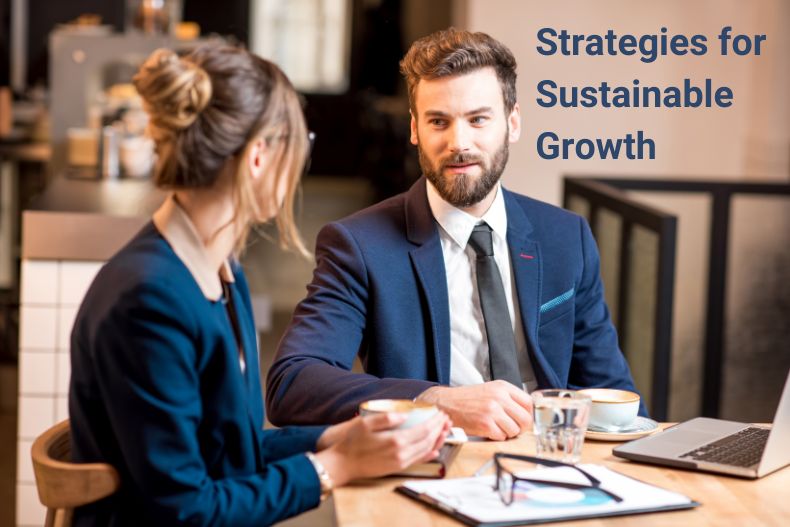Navigating the Australian business landscape is like exploring vast, uncharted waters. Companies strive for high growth while ensuring sustainability. This challenge is especially notable in Australia, a country known for its rich biodiversity and strong economy. Recent environmental issues and increasing consumer demand for ethical products have made sustainable growth a necessity, not just a goal.
In this context, Australian companies are adopting innovative growth strategies. They’re not just focused on profits; they also aim to benefit society and the environment. This approach is transforming the Australian business scene, making it a compelling example of sustainable growth for the rest of the world.

The Pillars of Sustainable Development in Australia
Sustainable development in Australia stands on three robust pillars: economic, social, and environmental sustainability. These aren’t just abstract concepts; they’re tangible practices that Australian companies are integrating into their core strategies. Economic sustainability here means fostering long-term growth without compromising social, environmental, and cultural aspects. Social sustainability focuses on managing business impacts on people and society, while environmental sustainability aims to minimise ecological damage.
Australian companies are leading by example in these areas. They’re showing the world how businesses can thrive by balancing profit with purpose, creating a blueprint for sustainable development that’s both innovative and practical. This approach not only ensures their long-term success but also contributes positively to society and the environment.
Strategic Sustainability
A shining example of strategic sustainability in action is Trinity Ventures, under the leadership of Sandrina Postorino. With a keen eye for investments that yield not just financial returns but also positive societal and environmental impacts, Postorino has steered Trinity Ventures to focus on unlisted high-growth Australian companies. This strategic direction not only aligns with her personal values as a passionate environmentalist but also serves as a beacon for other companies aiming for sustainable growth.
Postorino exemplifies how strategic investment decisions can lead to sustainable growth. By prioritising ventures that address societal and environmental challenges, the company has carved a niche for itself, demonstrating that it’s possible to achieve financial success while making a positive impact on the world.
Emerging Strategies
In their quest for sustainable growth, Australian companies are not just following trends; they’re setting them. They’re adopting circular economy models that promote resource efficiency and minimise waste, leveraging artificial intelligence to enhance sustainability, and pioneering green technologies. These strategies are not without their challenges, but the successes are reshaping the business landscape, offering a glimpse into the future of sustainable business practices.
Integrating these cutting-edge strategies requires agility and adaptability. As Claire Szatsznajder observed, “Agility, adaptability, resilience, and confidence in the future, and their place in it, have been key to driving sustained success for our new, and previous, Best Managed Companies winners.” This sentiment captures the essence of the emerging strategies for sustainable growth, highlighting the importance of resilience and forward-thinking in today’s business environment.
Leadership Driving Change
The journey towards sustainability is often spearheaded by visionary leaders. Danny Almagor, CEO of Small Giants, exemplifies this leadership. His dedication to supporting businesses focused on social and environmental impact has not only transformed Small Giants but also inspired other companies to follow suit. Leaders like Almagor understand that sustainable growth is not just about the bottom line; it’s about making a positive impact on the world.
Leadership in sustainability requires a unique blend of vision, courage, and perseverance. It’s about steering the company towards practices that ensure long-term success and societal well-being. This kind of leadership not only drives change within the company but also sets a benchmark for others in the industry.
Consumer Demand Shaping Sustainability
The shift towards sustainability is also being driven by consumers. Australians are increasingly demanding products that are not just high quality but also ethically produced and environmentally friendly. This consumer demand is reshaping how companies approach product development and marketing, pushing them towards more sustainable practices.
Rebecca Huntley, a leading researcher on social trends, highlights the importance of tapping into this demand. Companies that understand and engage with consumer expectations for sustainability are finding success in the market. This engagement requires authenticity and transparency, as consumers are quick to spot and reject greenwashing. By genuinely embracing sustainability, companies can build trust and loyalty among their customers.
Overcoming Challenges to Seize Opportunities
Adopting sustainable strategies is not without its challenges. Regulatory hurdles, financial constraints, and market resistance are just a few of the obstacles companies face. However, overcoming these challenges can lead to innovation, market differentiation, and resilience. Australian companies that have turned these challenges into opportunities for growth are setting examples for others to follow.
The journey towards sustainability is a complex one, but it’s also filled with opportunities for innovation and success. By embracing these challenges and leveraging them as catalysts for growth, companies can not only enhance their competitiveness but also contribute positively to society and the environment.
Metrics for Measuring Sustainable Success
Measuring the impact of sustainable growth strategies is crucial for companies to understand their progress and communicate their achievements. Professor Nick Barter notes, “Seventy-two per cent of the companies analysed had a publicly available purpose statement and they statistically outperformed on Environmental, Social and Governance (ESG) metrics.” This highlights the importance of clear metrics and KPIs in evaluating the success of sustainability initiatives.
Financial and non-financial metrics, along with certifications and standards, play a key role in measuring and communicating a company’s sustainability achievements. These metrics not only help companies track their progress but also bolster their sustainability claims, building credibility and trust with consumers, investors, and other stakeholders.
The Future of Sustainable Business in Australia
The future of sustainable business in Australia looks promising. With anticipated trends pointing towards increased innovation, policy changes, and evolving consumer preferences, Australian companies are well-positioned to lead the way in sustainable growth. As they adapt to these changes, their commitment to sustainability will not only drive their success but also contribute to a more sustainable and equitable world.
The journey towards sustainable growth is both a challenge and an opportunity for Australian companies. By embracing innovative strategies, visionary leadership, and consumer insights, they can achieve not just financial success but also make a positive impact on society and the environment. This is a call to action for businesses across Australia to not only adopt sustainable growth strategies but also to aim for leadership in global sustainability efforts, setting an example for the world to follow.











